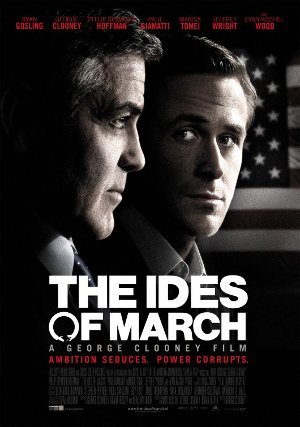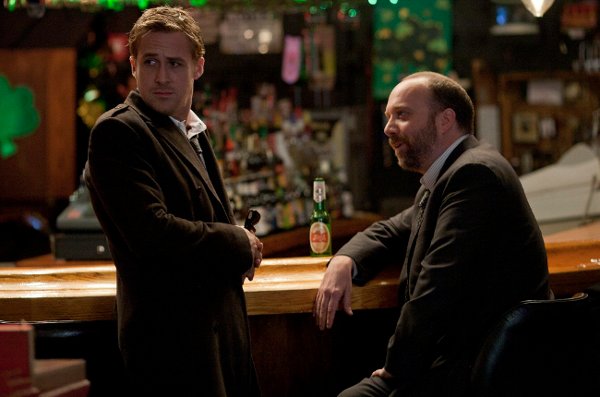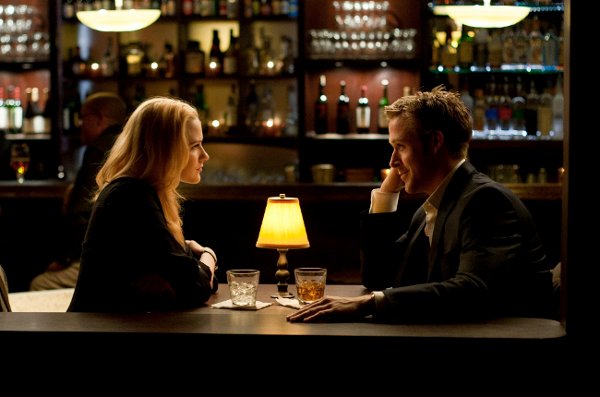- Title: The Ides of March
- IMDb: link

 The loss of innocence is the theme for George Clooney‘s latest directoral effort which centers around a high-ranking political staffer whose idealism is shattered over the course of the two-hour film as he learns just how dirty a business politics really is.
The loss of innocence is the theme for George Clooney‘s latest directoral effort which centers around a high-ranking political staffer whose idealism is shattered over the course of the two-hour film as he learns just how dirty a business politics really is.
The youthful Stephen Myers (Ryan Gosling) has worked on more campaigns that most staffers twice his age but he believes he’s finally found the real thing in Governor Mike Morris (Clooney). Morris is one of two front-runners for the Democratic Party’s nomination for President. With Myers help he might even make it, if he’ll agree to make the backroom deals to get him the delegates needed to sew-up the nomination.
Myers is approached by the campaign manager (Paul Giamatti) for Morris’ opposition who attempts to woo the wunderkid over to his campaign. Although he declines the offer, Myers’s hyper-paranoid boss (Philip Seymour Hoffman) is angered over his protege’s willingness to meet with the enemy.
His life is further complicated by a burgeoning relationship with with a beautiful and spunky 20 year-old intern (Evan Rachel Wood) who’s hiding her own secret, which once revealed will only further shatter his world.
Gosling has made a career of choosing characters who are slowly ground down over the course of a film and The Ides of March is no different. The world around the strategist begins to unravel all at once, but he has no one but himself to blame. Myers is the architect of his own destruction; his choices cause each of the events to occur.
The script by Clooney, Grant Heslov, and Beau Willimon is based on Willimon’s play, and with each revelation opens more possibilities for the characters instead of limiting where the film can go from that point on. More than once I was pleasantly surprised the film chose the road less traveled. The result is a series of choices that will keep you guessing how things will end.

If you have bad feelings towards the political process this isn’t the movie to change your mind. Clooney isn’t interested in glamorizing the events or giving us feel-good story. The Ides of March takes a harsh look at the realities on the campaign trail and the level of compromise, lying, deception, and heartbreak inherent in the process. The film pulls back the curtain of a political campaign and lets in the harsh light of day. You’re may not to like everything you see but the film does a wonderful job catching the actual feel of a campaign on-screen.
Gosling is terrific in the lead role and Clooney and Evan Rachel Wood are each well-cast in supporting roles. Wood is everything you’d expect (she’s probably the best actress her age working today) as she’s required to deliver the gamut of emotions over the course of the film. In his time in front of the camera Clooney enjoys himself as a more typical bastard of a politician than he initially appears.
The choice of Giamatti and Philip Seymour Hoffman as no-nonsense campaign managers is inspired. There are scenes between each of the separately with Gosling that are worth the price of admission alone. The film also includes small roles for Marisa Tomei as a reporter working the campaign circuit and Jeffrey Wright as a senator with the ability to hand Morris the nomination. As with the every other character in the film, each has their own agenda.

The film is memorable for its big dramatic moments but it has several small moments that work just as well. There’s a terrific scene between Clooney and Jennifer Ehle as the Governor’s wife in the back of the limo discussing strategy that isn’t necessary to the plot but gives you a different look at the character we wouldn’t otherwise see. Gosling and Wood’s first date in the hotel bar is unexpectedly frank and intimate. Clooney also makes a wonderful choice of forcing the audience to wait as a pivotal conversation late in the film takes place away from our prying eyes inside a parked car which the camera stays on but never allows us entrance to.
I’m almost as big a fan of George Clooney behind the camera as when he steps in front of it. I loved Good Night and Good Luck enough to make it my favorite movie of 2005 and I even enjoyed the less ambitious (and extremely Coen-esque) Leatherheads. With The Ides of March Clooney reminds us he’s not just a great actor but a terrific filmmaker that doesn’t shy away from the stories he wants to tell. Here he delivers one of the year’s best films and proves once again some guys really can do it all.

Alan,
The loss of innocence? This wasn’t the Wonder Years.
I agree that the script was good and the acting is often great (Clooney himself is meh), but your praise for Clooney’s direction is mind-boggling to me. It’s not terrible, but there is more to setting a frame than whether we shoot eye-level at a 45 or eye level a little closer to the line of action. Not every conversation should be shot in an OTS and almost everyone was.
And just because he allows the convo between Zara and Morris to happen away from our prying ears, that doesn’t make him a genius. They make the same less-than-inspired choices on Gray’s Anatomy, and that show sucks.
You can be a cheerleader for films you love. I will take the lonelier path, and be a critic.
If anyone would like the read the review of some that is not obviously in bed with George Clooney, then please click the link below.
http://www.scene-stealers.com/print-reviews/movie-review-the-ides-of-march/
I’ve got to disagree with you about how Clooney frames several of the conversations, as well as the reveals, throughout the film. He does far more than just set the camera down.
If I’m cheerleading the film you’re being over-critical of it. And, hey, who wouldn’t want to be in bed with George Clooney?
Not that it makes me right (being right makes me right), but I’m not by far the only one who found fault with the laziness of the direction.
I think you’re mistaking great acting which works to overcome mediocre directing.